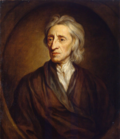Portal:Libertarianism
Introduction
Libertarianism (from French: libertaire, lit. 'free and egalitarian'; or from Latin: libertas, lit. 'freedom') is a political philosophy that holds freedom, personal sovereignty, and liberty as primary values. Many libertarians believe that the concept of freedom is in accord with the Non-Aggression Principle, according to which each individual has the right to live as they choose, as long as they do not violate the rights of others by initiating force or fraud against them.
Libertarians advocate the expansion of individual autonomy and political self-determination, emphasizing the principles of equality before the law and the protection of civil rights, including the rights to freedom of association, freedom of speech, freedom of thought and freedom of choice. They generally support individual liberty and oppose authority, state power, warfare, militarism and nationalism, but some libertarians diverge on the scope and nature of their opposition to existing economic and political systems. (Full article...)
Selected article
Classical liberalism is a political philosophy committed to the ideal of limited government and liberty of individuals, including freedom of religion, speech, press, assembly and free markets.
Classical liberalism developed in the 19th century in Western Europe and the Americas. Although classical liberalism built on ideas that had already developed by the end of the 18th century, it advocated a specific kind of society, government and public policy required as a result of the Industrial Revolution and urbanization. Notable individuals who have contributed to classical liberalism include Jean-Baptiste Say, Thomas Malthus and David Ricardo. It drew on the economics of Adam Smith, a psychological understanding of individual liberty, natural law and utilitarianism and a belief in progress. Classical liberals established political parties that were called "Liberal", although in the United States classical liberalism came to dominate both existing major political parties. There was a revival of interest in classical liberalism in the 20th century led by Friedrich Hayek and Milton Friedman.
In the late 19th century, classical liberalism developed into neo-classical liberalism, which argued for government to be as small as possible in order to allow the exercise of individual freedom. In its most extreme form, it advocated social Darwinism. Right-libertarianism is a modern form of neo-classical liberalism. The term "classical liberalism" was applied in retrospect to distinguish earlier 19th-century liberalism from the newer social liberalism. Classical liberalism is also sometimes used to refer to all forms of liberalism before the 20th century whereas some American conservatives and libertarians use it to describe their belief in the primacy of economic freedom and minimal government. However, it is not always clear which meaning is intended.
Selected quote
| “ | Even more remarkably, the Libertarian party achieved this growth while consistently adhering to a new ideological creed—"libertarianism"—thus bringing to the American political scene for the first time in a century a party interested in principle rather than in merely gaining jobs and money at the public trough. We have been told countless times by pundits and political scientists that the genius of America and of our party system is its lack of ideology and its "pragmatism" (a kind word for focusing solely on grabbing money and jobs from the hapless taxpayers). How, then, explain the amazing growth of a new party which is frankly and eagerly devoted to ideology?
One explanation is that Americans were not always pragmatic and nonideological. On the contrary, historians now realize that the American Revolution itself was not only ideological but also the result of devotion to the creed and the institutions of libertarianism. The American revolutionaries were steeped in the creed of libertarianism, an ideology which led them to resist with their lives, their fortunes, and their sacred honor the invasions of their rights and liberties committed by the imperial British government. Historians have long debated the precise causes of the American Revolution: Were they constitutional, economic, political, or ideological? We now realize that, being libertarians, the revolutionaries saw no conflict between moral and political rights on the one hand and economic freedom on the other. On the contrary, they perceived civil and moral liberty, political independence, and the freedom to trade and produce as all part of one unblemished system, what Adam Smith was to call, in the same year that the Declaration of Independence was written, the "obvious and simple system of natural liberty." |
” |
| — Murray Rothbard (1926–1995) For a New Liberty (1973) |
Selected picture
 |
General images
Selected biography -

Steven Wynn "Steve" Kubby (December 28, 1946 – November 20, 2022) was a Libertarian Party activist who played a key role in the drafting and passage of California Proposition 215. The proposition was a ballot initiative to legalize medical marijuana which was approved by voters in 1996. Kubby was known as a cancer patient who relied on medical cannabis.
Kubby authored two books on drug policy reform: The Politics of Consciousness (1995) and Why Marijuana Should Be Legal (2003). He was the Libertarian Party of California candidate for Governor of California in 1998, receiving 0.9% of the vote. In 2008, he declared his candidacy for the Libertarian Party's 2008 presidential nomination and received significant support for the nomination, but was eliminated after the second ballot. (Full article...)
Related portals
Parent portals
Socio-political portals
Topics
Categories
Points of interest
| Points of interest related to Libertarianism on Wikipedia: History – Portal – Category – WikiProject – Alerts – Deletions – Assessment |
Associated Wikimedia
The following Wikimedia Foundation sister projects provide more on this subject:
-
Commons
Free media repository -
Wikibooks
Free textbooks and manuals -
Wikidata
Free knowledge base -
Wikinews
Free-content news -
Wikiquote
Collection of quotations -
Wikisource
Free-content library -
Wikiversity
Free learning tools -
Wiktionary
Dictionary and thesaurus



































